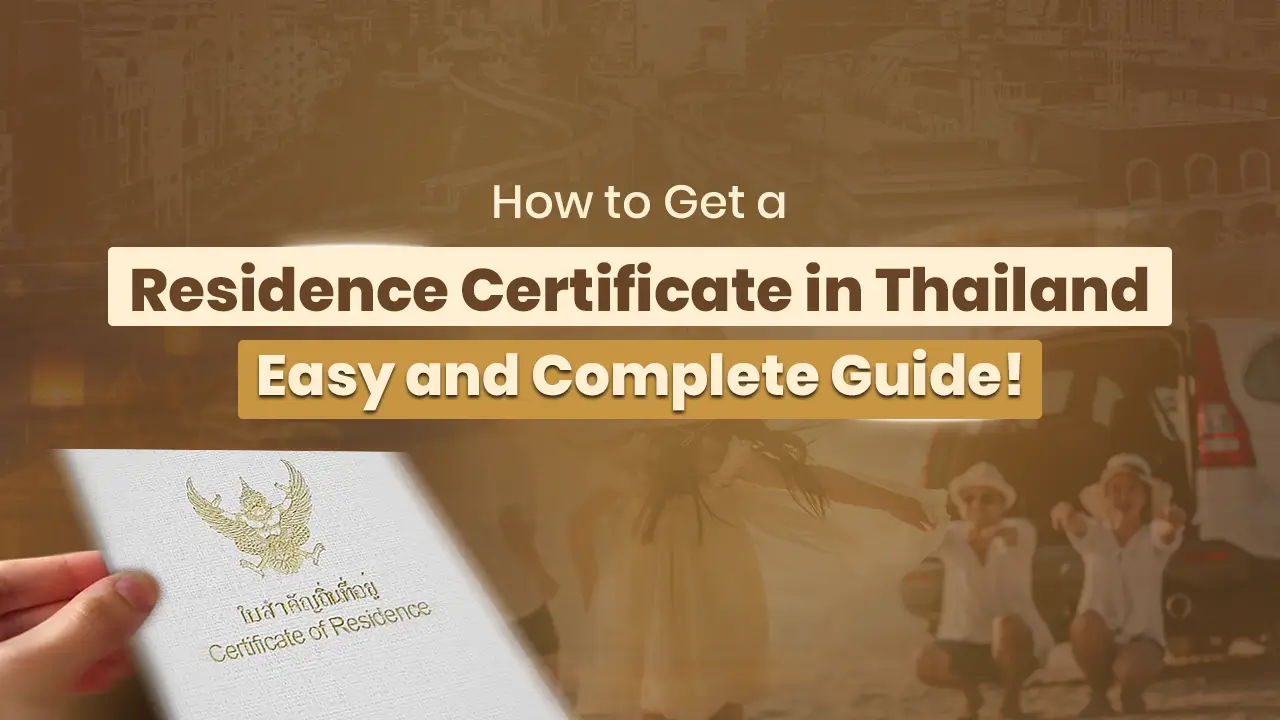When living in Thailand, you can come across a piece of paper, whether at work, at school, or just spending vacation, known as a residence certificate Thailand. This may sound somewhat confusing, but fear not. This certificate is merely a formal document that certifies your residence in Thailand.
Why does it matter? You will probably need it on regular occasions, though, to do such common things as open a bank account, take out a driver’s licence, or renew your visa. Simply put, it serves as your formal address of proof, which will streamline several legal and practical activities that you need to complete during your residency in this country.
In this guide, I will take you through a residence certificate, its purpose, and how you can get one in Thailand step by step without any hassle.
What is a Residence Certificate?
A residence certificate in Thailand is an official document that confirms where you live in the country. It is published by the Immigration Office where you are staying and is very popular as your legal document of address. It is also referred to by many as numbers TM.15, TM.16, or TM.18.
This certificate contains your name and your Thai address, and the stamp or seal of the immigration office where you obtained the certificate. The residence certificate, unlike the TM.30 slip (which merely lists that your landlord has registered your stay), is a document that certifies your address at face value.
In most cases the certificate expires after about 30 days of the date of issue, and most offices would not accept the certificate as a photocopy or scanned copy; only the original certificate would be accepted. Therefore, it is a small but very important piece of paper that can save you time and inconvenience each time you have to prove your residence in Thailand.
Why You Might Need a Residence Certificate in Thailand
In everyday life, a residence certificate in Thailand acts as your official proof of address. Different offices may ask for it for different reasons, but these are the most common:
Get a Thai driver’s licence
The Department of Land Transport (DLT) asks foreigners to show government-issued proof of residence (from Immigration or your embassy) when applying. Many guides, and even official LTR visa instructions, spell this out clearly.
Register/transfer ownership of a car or motorbike
When you put a vehicle in your name, DLT typically wants proof of where you live, often a certificate of residence or a work permit. Several step-by-step guides note this requirement.
Open a bank account (varies by bank/branch)
Many branches ask for proof of address in Thailand. A rental contract or utility bill can work; some banks also accept an immigration residence certificate. Policies differ, so it helps to bring multiple proofs.
Handle “address-sensitive” tasks
Think things like updating bank KYC, arranging certain insurance or admin tasks, or sorting paperwork that must match your Thai address. Having a certificate of residence on hand often prevents back-and-forth.
Quick tip: For DLT matters (licences/vehicle registration), an embassy letter can sometimes substitute for a Thai residence certificate, but Immigration’s certificate is widely recognised and usually the simplest choice.
Who Can Apply for a Thai Residence Certificate?
The positive part is that any foreigner who has a valid visa can apply for a residence certificate in Thailand. The only major requirement is that you must have a real, fixed address in the country. Here’s a breakdown:
- Long-term visa holders- When you have a work visa, retirement visa, marriage visa, or education visa, chances are that you will be required to get a certificate at some point.
- Expat workers- When dealing with contracts and tax or work permit paperwork, most employers or government offices will require a certificate of residence.
- Students- When you are enrolling in schools, universities, or language programmes, you are sometimes required to provide evidence of your local address.
- Retirees- When opening a bank account or registering for insurance, or even taking out a driving licence, this document is often required.
- Vehicle owners- When purchasing, selling or registering a car or motorbike, the Department of Land Transport commonly requires a Thai residence certificate.
- Anyone who will require proof of address- Even when you are not working or studying, you may still need it when opening utility services, signing up for a mobile network, or getting other official documents.
It is notable that citizens of Thailand do not usually require this certificate, as they already have an ID card and household registration (tabien baan) as the residence documentation. The document is principally aimed at assisting foreign residents in their smooth sailing through official procedures.
Required Documents for Getting a Certificate of Residence
Before you apply for a certificate of residency in Thailand, make sure you have these documents ready:
- Passport and a Copy of the Photo Page: Bring your original passport. Make one clear copy of the page with your photo and details.
- Copy of Your Thai Visa: Print a copy of the visa page that shows the type and length of your stay.
- TM.6 Arrival/Departure Card: If you received this card when entering Thailand, bring both the original and a copy. Some airports no longer issue it, but if you have one, keep it safe.
- Two Passport Photos: Use recent photos with a white background. Standard visa size works.
- Proof of Address: Bring your lease agreement if you rent. Bring a copy of the house registration book (yellow Tabien Baan) if you own or live with a Thai family.
- TM.30 Slip or Address Notification Receipt: This is the form your landlord or hotel files to report your stay. Immigration usually asks for it.
The documents vary; some offices may also ask for your landlord’s ID copy, so it’s smart to check with your local immigration office before you go.
Step-by-Step Application Process for a Residence Certificate in Thailand
Here’s how you can apply for a residence certificate Thailand: Step-by-Step Process
Step 1: Prepare the valid documents.
- Bring a valid passport and a photocopy of the page.
- Copy your current visa.
- Carry your TM.6 card (if issued) and a copy.
- Bring two passport-sized photos.
- Your proof of residency, a leasing contract, or a copy of the house registration book (Tabien Baan).
- Include the TM.30 slip or address notification receipt from your landlord or hotel.
- A copy of your landlord’s ID. (Rules vary.)
Step 2: Visit the local immigration office.
- Go to the closest immigration office.
- In Bangkok, it is the Chaeng Wattana Immigration Office.
- Be sure to come early in the morning to avoid the long line.
Step 3: First, request the application form.
- Request the residence certificate application form at the desk.
- The form is also called TM.15, TM.16, or TM.18.
- Complete it with the necessary information
Step 4: Submit the application form
- Present the form with your supporting documents.
- The officer will examine your documents.
- In case of something missing, you might be requested to come back with the right document.
Step 5: Pay your fee
- Some immigration offices issue the certificate free of charge.
- Others may charge between 200–500 THB.
- Bring cash, as many offices don’t accept cards.
Step 6: Wait for processing
- Processing times vary by office.
- Some offices give the certificate on the same day.
- Others may ask you to return in 2–3 days.
Step 7: Collect your residence certificate
- Go back to the office on the date they tell you.
- Bring your passport and collection slip if given.
- Collect the original residence certificate, including your personal details, Thai address, and the immigration office stamp.
- Keep the document safe; photocopies are not allowed for official use.
Alternative and Related Document for a Resident Certificate
In some cases, it is not possible to receive a residence certificate from the immigration, or you might need another document for a particular purpose. Here are some common options:
Embassy Letter
A letter confirming your local address can be issued by many foreign embassies in Thailand. The Department of Land Transport tends to take this as true during a driver’s licence application or a vehicle registration. It is usually fast, and often the embassies charge a higher fee than immigration.
Work Permit
When you work in Thailand, the work permit normally includes your present address in Thailand. Certain offices accept this as a legitimate form of residence, like the banking and government documentation.
Bank Statements or Utility Bills.
Some banks might require current utility bills or a statement that includes your address in Thailand to do jobs like opening accounts. But this is not always the case, and it varies with the branch.
The house registration book (Tabien Baan)
In case you have property in Thailand or you live with a Thai family, in some cases, the house registration book may act as evidence of address. The foreigners are typically put on the yellow Tabien Baan, as the Thai citizens are on the blue Tabien Baan.
Although such documents might be effective in some situations, the immigration-issued residence certificate is the most common. When you are not sure about the evidence needed, then it is always better to request the certificate to avoid postponing or being rejected.
Common Mistakes to Avoid and Helpful Tips
The process of applying for a residence certificate in Thailand is not so hard; however, many individuals have to wait a lot due to minor errors.
The following are a few things to be on the lookout for to simplify the process:
- Check the entire list of documents and then leave.
- The photocopies must be readable and clear.
- Carry spare photocopies of your passport, visa, and TM.30.
- If your landlord hasn’t filed the TM.30 or refuses to provide their ID copy, immigration may reject your application.
- Pre-remind your landlord and save the TM.30 slip.
- Go in the early morning to avoid the long queues. Immigration offices can be extremely busy in large cities.
- Remember to bring two recent passport photos.
- Don’t assume all offices follow the same rules. Rules vary.
- Always visit your local immigration office’s website before visiting or calling.
Pro Tip: Keep a small folder of all your important documents and copies. It helps in saving a lot of inconvenience in handling various offices.
Wrapping Up: Certificate of Residence in Thailand
Getting a residence certificate in Thailand may be another piece of paperwork, but this is one of the documents that can make life much easier. Whenever you need to get a driving licence, open a bank account, or register a car, this certificate will act as your formal address authentication and make your life easier.
The task is easy: you have to prepare your papers, go to the appropriate immigration office, and proceed step by step. Holding a certificate means you won’t spend a minute waiting in line, and you have the comfort of knowing that you have the cover whenever you are called on to prove your residence.
Paperwork should not be a burden; just follow this guide, and you will be able to obtain your residence certificate in Thailand within a short time.
FAQs
Q: Is it possible to get a residence certificate online?
Ans: No. You will have to apply physically at your local immigration office at this point. Part of it can be downloaded online, yet submission and document verification are performed in person.
Q: What is the time required to obtain the certificate?
Ans: It depends on the office. Other immigration offices give the certificate the same day, and some immigration offices request you to return in 2-3 working days.
Q: How much does it cost for a residence certificate in Thailand?
Ans: In many immigration offices, the certificate is free. Others charge a small fee, usually between 200–500 THB. Embassies often charge more if you request an address confirmation letter from them instead.
Q: Does my landlord have to be present?
Ans: Not necessarily, but in certain immigration offices, they might require a copy of an ID or the confirmation of your landlord. In the case where your landlord has not provided the TM.30 (address notification), you might not be able to apply until he or she does so.
Q: Is it possible to use photocopies of the certificate?
Ans: No. The original certificate of residence with the immigration stamp is accepted in most offices only. Official work, such as obtaining a driver’s licence or vehicle registration, cannot be done with photocopies.
Q: What if I move to a new address?
Ans: You have to amend your TM.30 address notification and, where necessary, request a new residence certificate, which will show your new location of residence. Each certificate is attached to your present address.




